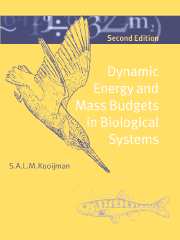Book contents
- Frontmatter
- Contents
- Preface to the second edition
- Preface
- Book organization
- Acknowledgements
- 1 Energetics and models
- 2 Basic concepts
- 3 Energy acquisition and use
- 4 Uptake and use of essential compounds
- 5 Multivariate DEB models
- 6 Uptake and effects of non-essential compounds
- 7 Case studies
- 8 Comparison of species
- 9 Living together
- 10 Evaluation
- Bibliography
- Glossary
- Notation and symbols
- Taxonomic index
- Subject index
4 - Uptake and use of essential compounds
Published online by Cambridge University Press: 12 March 2010
- Frontmatter
- Contents
- Preface to the second edition
- Preface
- Book organization
- Acknowledgements
- 1 Energetics and models
- 2 Basic concepts
- 3 Energy acquisition and use
- 4 Uptake and use of essential compounds
- 5 Multivariate DEB models
- 6 Uptake and effects of non-essential compounds
- 7 Case studies
- 8 Comparison of species
- 9 Living together
- 10 Evaluation
- Bibliography
- Glossary
- Notation and symbols
- Taxonomic index
- Subject index
Summary
The previous chapter focused on energy, but energy and mass are two aspects of the same thing. Mass takes the form of many compounds, each having their own set of characteristic properties, which makes the analysis of mass more complex than that of energy.
This chapter derives the fluxes of essential compounds. The derivation holds for a broad class of models for which the general assumptions of Table 3.3, {121}, apply [518,524]. This is why I made two categories of assumptions; the specific assumptions turn out not to be essential for these derivations. They may be replaced by others, resulting in other specifications of the three basic powers (assimilation, dissipation and growth), while the derivation of how fluxes of essential compounds relate to the basic powers still applies. In other words, rules for mass fluxes do not allow supplementary assumptions on mass fluxes, such as respiration or nitrogenous waste, without creating inconsistencies. I show why fluxes of essential compounds are weighted sums of these three basic powers. Non-essential compounds differ from essential ones because their use is not regulated; they are excreted into the environment, sometimes in modified form, as analysed later, see {187}.
Just like mass fluxes, dissipating heat is a weighted sum of the three basic powers. Therefore, it can also be written as a weighted sum of three mineral fluxes: carbon dioxide, oxygen and nitrogenous waste. This relationship is the basis of the method of indirect calorimetry. After half a century of wide application, this empirical method is finally underpinned theoretically.
- Type
- Chapter
- Information
- Dynamic Energy and Mass Budgets in Biological Systems , pp. 125 - 158Publisher: Cambridge University PressPrint publication year: 2000



